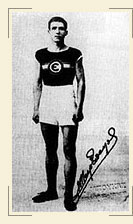|
The Balkan Games
For several decades, which could be conventionally defined between the last quarter of the 19th c and the first quarter of the 20th c, the relations  among the Balkan States were characterized by tension. The bone of contention was the territories of the Ottoman Empire. The Balkan Wars in 1912-13, World War I and the Asia Minor Campaign led to radical changes of the boundaries, to the creation of new states (Albania, Yugoslavia, Turkey) and to a large-scale exchange of populations from one country to another, often through special treaties that accompanied the termination of successive wars. among the Balkan States were characterized by tension. The bone of contention was the territories of the Ottoman Empire. The Balkan Wars in 1912-13, World War I and the Asia Minor Campaign led to radical changes of the boundaries, to the creation of new states (Albania, Yugoslavia, Turkey) and to a large-scale exchange of populations from one country to another, often through special treaties that accompanied the termination of successive wars.
Under these circumstances, the proposal of the SEAGS in 1924, at the international sports congress held in Paris on the occasion of the Olympic Games, concerning the organization of sports games among the Balkan States was not favourably met. The distrust of the representatives of the other countries seems justified for two more reasons. At that time the development of sports institutions in the other Balkan States was in an early stage. Furthermore, apart from the Olympic Games there was no other international sports institution. It is characteristic that the first games of Central America and of the Caribbean were organized two years later, in 1926, the Commonwealth Games in 1930, the Paneuropean in 1934, the Mediterranean in 1949 and the Panamerican in 1951Ι Therefore, Greece's proposal met with no response.
Four years later, in Amsterdam, the proposal was brought up again and this time Greece assumed the expenses of a "test" organization. Indeed, those Games took place in Athens in September 1929 and were called First Pan-Balkan Games. The participant athletes came from Greece, Yugoslavia, Romania and Bulgaria. These Games were the prelude to the first Balkan Games organized the following year (1930) in Athens again, this time with the participation of Turkey, favoured by the policy that Venizelos and Atat_rk pursued from1929-30, which aimed at smoothing out the relations between the two countries. The Greek capital hosted the Balkan Games in the following years as well, until 1934, when they were held in Zagreb, Yugoslavia. In the following years the games were organized in other Balkan capitals, including Constantinople, which organized the Games of 1935 and 1940, the last Games to be staged before the outbreak of World War II.
A long period of interruption of the games ensued due to World War II and to the radical political changes brought about in almost all the Balkan countries after the termination of the War. As a result, the Balkan Games resumed in 1953 in Athens and continued on an annual basis and without interruption until the 1980s, every time in a different city. Those years, which were the heyday of the games, Athens had hosted them five times, and one time they were held in Thessaloniki (1978). During the same decades the Balkan Games were organized gradually for the majority of sports.
The institution of the Balkan Games started to decline from the 1980s. The Games were not organized in 1987, 1991, 1993 and 1995. Greece, in an attempt to preserve the institution, organized the games four times in the five-year period 1997-2001. The conditions that have contributed to the decline should be sought both in the political rearrangements and the war of the 1990s, as well as in the great number of international games and meetings with a higher level of competition, which are preferred by the best athletes of each country.
|